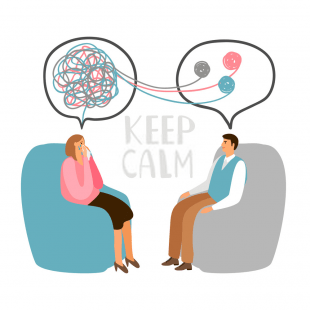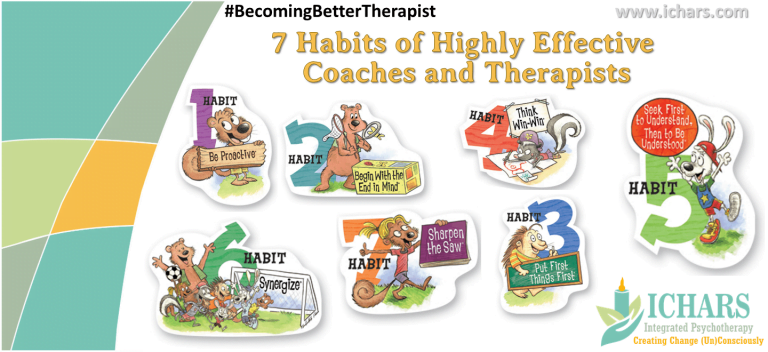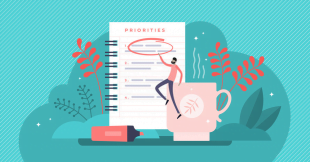Introduction
Remember the book, “The 7 Habits of Highly Effective People” by Stephen Covey? The book has remained a bestseller ever since it was first published in 1989. People from all walks of life buy and read it for self-help.
Have you ever wondered what is so effective about the book?
Still wondering?
The book does what an effective coach or therapist does. It helps people solve their problems.
Since we, at ICHARS, love studying brilliance, let’s see if Covey’s principles can be used to become a successful and highly effective coach or therapist (To understand the difference between the two, check out this table).
 In his book, Covey talks about:
In his book, Covey talks about:- Recognizing problems
- Knowing the end goal and how to reach it
- Being able to adapt
- Taking advantage of opportunities that come with change
If you’re a coach or a therapist, you have already recognized these. After all, it’s what you do! – enabling people to resolve issues so they can live a better life, doing what they want and feeling the way they want to feel.
Here are the 7 habits of highly effective people that he proposes and our take on it.
Be Proactive
This habit emphasizes taking responsibility for your life. Proactive people make things happen and when things go wrong, they don’t blame anyone else.
On the other hand, some people are reactive and they blame another person or situation when things go south. As a result, instead of creating the life they want to live, they let circumstances dictate what happens in their lives.
A highly effective coach or therapist, would surely be proactive. For instance, internet and social media has made it easier than ever to run a coaching practice. However, this ease has allowed many people to utilize this advantage. That means more competition.
And if you want more clients, you have to be proactive. By being proactive about building a successful practice, you’ll can help more people.
So, you focus on what you can control. And what are they?
- Ask existing, happy clients to give you testimonials and post them on social media and your website
- Post regular updates and useful, relevant content on social media
- Record short video clips that will generate interest among your target audience
Begin with the End in Mind
This habit is about knowing what you want in your life.
However, many of your clients may know what they want but are stuck at how to go about doing it.
They know the job they want, what they want in their relationship, the kind of money they should have in the bank or even what weight they want to be at. They may even know the steps to get there but somehow, they don’t know how to do it. For example, a person may know that s/he should be able to handle criticism from the boss in the office but s/he just can’t do it.
As a highly effective coach or therapist, you can help the person explore what is happening below the surface and when they have identified the obstacles, you can help them access their inner resources, work with it and bring about a change.
You can do that as part of the change work using highly effective SOFT SEA coaching and therapy model that we cover in our Cognitive Hypnotic Coaching and Psychotherapy Level 1.
First Things First
 This is actually a combination of the first and second habit.
This is actually a combination of the first and second habit.So, you need to be proactive, but you also need to prioritize.
The same applies to your clients. They need to focus on their priorities, on the goals identified in the second habit.
For example, you have a client who is constantly thinking about work when s/he is not at work, and at work, thinking about what s/he would do when away from it.
You help him/her discover the underlying issue. It could be as simple as a wish to spend more time with their family because their family is their priority.
They know they need to provide for their family, but they also realize that work is only a means to an end.
As a highly effective coach or therapist, you can help them focus on what’s most important such that they understand that –
- Work adds meaning to life but it’s not their whole life
- They don’t have to do everything by themselves
- It’s alright to say no when required
Helping them focus on what matters most to them while they’re in a hypnotic state will ensure that the message gets through to the unconscious mind.
Let the client formulate their own suggestions that you can place during the hypnotic process. Remember that the suggestions should follow the basic principles of suggestion creation to achieve the desired outcome.
Win-Win Scenario
This one is about building long-term relationships based on mutual trust and respect.
That is a no-brainer if you’re a hypnotic coach because everything you do depends on respecting the client’s map of reality and his/her trust in you.
Covey talks about having 3 things for a win-win attitude –
- Integrity
- Maturity
- Abundance Mentality
The parallels are obvious in Cognitive hypnotic work. When a client comes to you with a problem, it doesn’t matter what the problem is because you respect their ideas and feelings. Your goal is to build trust, communicate, enable them to identify the goals, actions and obstacles, and help them harness their internal resources to overcome roadblocks and reach the goal.
Seek to Understand and then to be Understood
This habit is about communication in a hypnotic setting.
As a highly effective coach or therapist, you already know that communication involves much more than words. You know that you and your clients can communicate how you’re feeling and what you’re thinking, even without saying a word.
And it’s also important to develop the other skills for effective communication, such as listening and being empathetic.
Effective coaches and therapists are able to do all this by actively listening and sticking to the client’s map of reality, down to each and every word.
Synergize
This refers to the ability to cooperate and produce better results together.
This would resonate with any good therapist because their entire work requires creative cooperation. For example, you can’t make someone visualize something unless they want to but if they agree and show compliance, the outcome can be almost magical.
Covey calls it – “Teamwork, open-mindedness, and the adventure of finding new solutions to old problems.”
And that’s exactly what occurs during a successful coaching or therapy session when you use Cognitive Hypnotic Coaching and Psychotherapy approach to help clients reach a goal.
Sharpen the Saw
 This habit refers to keeping yourself in perfect shape by devoting time to the physical, social/emotional and mental aspects of your life.
This habit refers to keeping yourself in perfect shape by devoting time to the physical, social/emotional and mental aspects of your life.Looking after yourself helps you stay fresh and energetic, such that you can utilize your internal resources and states to practice the other habits and help people transform their lives.
For effective coaches and therapists, it means that you are continually learning about enabling clients achieve what they want.
If you are a coach or a trainer who would like to develop advanced coaching competencies, you would love the Cognitive Hypnotic Coaching™ Program.
If you are a psychologist who would like to develop advanced therapeutic skills, you must search for the Cognitive Hypnotic Psychotherapy™ Program.

 This is actually a combination of the first and second habit.
This is actually a combination of the first and second habit. This habit refers to keeping yourself in perfect shape by devoting time to the physical, social/emotional and mental aspects of your life.
This habit refers to keeping yourself in perfect shape by devoting time to the physical, social/emotional and mental aspects of your life.